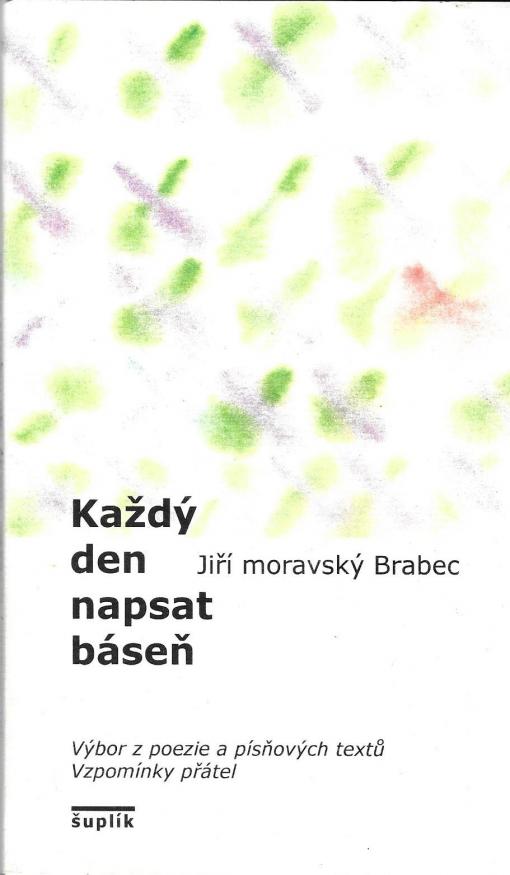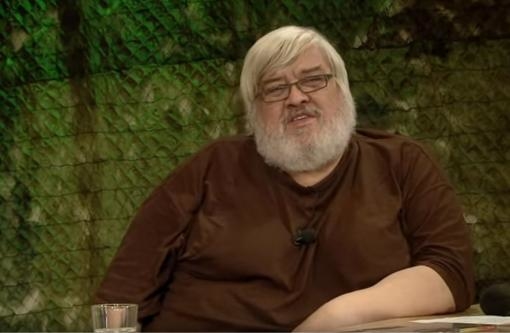When pronouncing the name Jiří ‘moravský’ Brabec (1955-2018) (the name is partly a pun referring to a typical Moravian dish called "moravský vrabec", which is pork roast with braised cabbage and dumplings – translator's note), anyone, who until recently had any business concerning the Czech-Moravian folk and country scene, is reminded of the unmistakeable figure of a mighty man wearing a beard, with a strong voice and an inexhaustible source of information, and an enviable general knowledge of not only the above-mentioned music genre. We are speaking here about a complicated but deservedly respected personality who was able to surprise us with his knowledge in a number of disciplines, but also with his self-deprecating humour and unexpected physical dexterity. Unfortunately, for the last time he surprised people around him with his sudden departure, only a few days before his sixty-third birthday in June 2018, almost unnoticed by the public media, for which he had worked for so many years.
In the end, it was down to the town of Kuřim to take care of a partial remedy; in fact, Jiří Brabec dedicated most of his efforts to this town: he lived there for almost forty years (from 1979) and worked in the cultural and later also in the political sphere. Jiří Plocek, an experienced editor of similar literary tributes, sorted a small collection book for the Šuplík publishing house; he selected a representative collection of Jiří's poems and song lyrics followed by a collection of personal testimonies from eleven friends and closest collaborators. A modest collection of verses and respectful, yet mostly entertaining memories took its name after the incipit of a self-ironic quatrain Každý den napsat báseň [To Write a Poem Every Day] and is worth attention not only out of consideration for the concluded work of this great entertainer, festival programme director, creative writer and presenter of well-founded club, radio and television programmes, computer media promoter, editor and contributor to most varied, not only music periodicals (it was not for nothing that the Folk and Country magazine was nicknamed "brabcoviny" [Brabec's Magazine] in the 1990s), but also an expression of respect as well as a joyful memory of a friend and buddy. From my own personal experience, I would like to top up the list of his professional skills with the following items: a navigator of car drivers, a lover of felines (a cat used to be his respected faithful ‘homie’) and also an acclaimed juror of music competitions and an indefatigable talent seeker. It was generally known that he was an excellent and sought-after lyricist with clients ranging from Bokomara through Hradišťan, brother and sister Ulrych, Mošny, to Slávek Janoušek and Vlasta Redl – however, the anthology discovered (certainly not only for me) Jiří ‘moravský’ Brabec also as a poet. Jiří Plocek says that for the first half of the book he made a selection from Brabec's unpublished poetry collection from 1990 named The Years of Christ, which was distributed only among friends. Not every lyricist is a poet; Jiří was one, maybe modest, but distinctive, and as Plocek's sampler suggests, he would fill a self-standing collection including also song lyrics without a problem. Although love lyrics predominate in the selection, there are also self-ironising comments (see the title quatrain), language plays with Czech (O azyl jazyk prosím [Asking Language for Asylum]) and the declared life attitude of a Christian not estranged from anything mundane. Many verses reflect a love for the poetics of folk songs (Zbojník [A Brigand] – a beautiful echo song) and his admiration for Jan Skácel (Koloběh [Cycle]), with whom he has in common the theme of departing for solitude and death.

The second part of the anthology is filled with memories of friends working together with him (Michal Jupp Konečný, Milan Jablonský, Jiří Pavlica and Petr Sedláček), which sometimes have a humorous spirit (Slávek Janoušek, Vlasta Redl and Ivo Cicvárek) or a description of an almost fateful or initiatory meeting (Honza and Stáňa Žamboch and Milan Tesař). It turned out to be a great idea to attach Brabec's distinctive poetic or prosaic text to these memories – readers are thus reminded, for example, of two of Brabec's aptly ironic articles České hlavy a hlavičky [Czech Heads and Headings] and První máj 2010 [May Day 2010]. Brabec's long-term lyrics engagement in the group Bokomara is twice remembered, with the magnum opus resulting therefrom – the album Bokomarie. All the more so I miss among the reminiscence testimonies a contribution by Luboš Javůrek, who (at the expense of his own personal memories) was thematically replaced by Jirka Plocek. The tiny book closes poetically and very personally with an article entitled Poslední Jirkova sezóna [Jirka's Last Season] written by Hana Novotná, Jiří's colleague from Kuřim.
The anthology is a brief and respectful reflection on a smart, educated and in many ways unnecessarily modest person, remembered (and usually for a long time) by everyone who saw or met him. For many followers in the profession of a publicist, he was an inspiration and role model, especially in his thorough preparation for each planned dialogue, the ability to ask questions cleverly and listen to the answers. His highly erudite and stylistically refined interviews were among the best that could be read in the genre at the turn of the millennium. It is a pity that it was this particular skill that the anthology has not reflected at least with one example. Nevertheless, the 110 pages are really valuable and worth reading.
Jiří moravský Brabec: Každý den napsat báseň. Anthology of poetry, song lyrics and memories of friends. Edited by Jiří Plocek. Brno 2019, Andrea Slaninová-Šuplík. 110 pages.































No comment added yet..